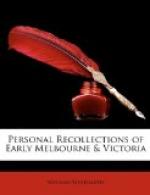The bracing cold once more.
Transferring ourselves now to the night mail, and awaking with the broad daylight of a sunny morning between Yass and Goulburn, we looked out upon a country all white with hoar frost, while our carriage windows had an inside coating of ice. This recalled an inspiring discussion at the Chamber of Commerce dinner a fortnight before, on my introducing the question of the snow and the highest civilization it symbolized. I had said that Victoria as well as Tasmania presented the significant snow. Mr. Service, the leader of the federation movement, alike intercolonial and imperial, corrected me by substituting Australian for Victorian snow. But Mr. Macdonald Patterson, of Queensland, extended the snow line well over even northern New South Wales, as he told us of a heavy snowstorm he had encountered when travelling south from Brisbane, and which lay so thickly upon the ground as to tempt the passengers to a vigorous snowballing, which latterly concentrated upon the railway guard for his grudging attempt to end the sport by ringing his signal bell. But this snow and cold, however favourable to ultimate civilization, were by no means a pleasure just at the moment, and I had to put on the very warmest clothing I ever heaped upon me in an English or Scotch winter. Nor did I escape a severe cold withal, which is only now disappearing under the genial influence of the balmy air of Queensland, which, now as I write, comes to us off the land towards the end of our voyage from Sydney to Brisbane (19th-21st August). We are just passing the South Queensland boundary of 30 degrees latitude, and as a few more hours will land us amidst troops of new friends at Brisbane, I expedite my work, fearing that, as at Melbourne, our brief space of time will be otherwise occupied.
Melbourne and Sydney.
Having just seen Sydney as well as Melbourne, I feel bound to give my impressions of both, which will, I think, be best and most briefly done in the form of a comparative sketch. I must premise with the remark that the great extent of both cities, the great and solid basis of trade on which they appear to rest, and above all the quick and ready step with which they apply to practical purposes the progress, mechanical or scientific, of our age, are beyond anything I had expected to meet with, well prepared as I had previously been upon the subject. Thus the electric light, electric bells, and other electric uses, the telephone, and the lift system, all seem to me in more general use than in London and our larger Home cities. The lift, for instance, is, as the rule, in every bank or other large institution for the use of the staff or customers or visitors. It is certainly as yet the rare exception in such cases in London.
The Sydney press.




